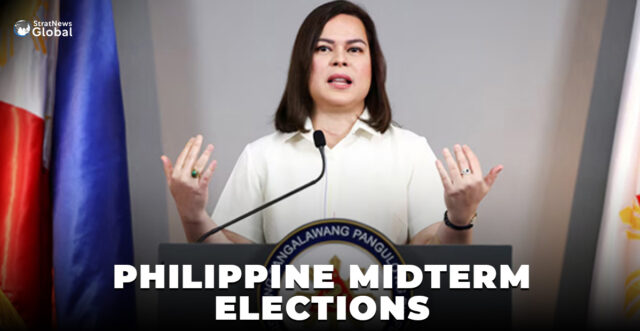While the Philippine midterm election appeared to favour President Ferdinand Marcos Jr., the surprisingly strong performance of his estranged vice president and rival, Sara Duterte, could have shaken his position, raising the potential for a shift in the balance of power for the remainder of his term.
Despite surveys predicting the president’s allies would sweep the Senate election, Duterte gained an important foothold in the high-profile chamber that could ensure she survives a concerted effort by Marcos loyalists to banish her from politics via impeachment and deny her a presidential run in 2028.
Monday’s outcome showed Duterte’s influence remains far from diminished, despite an acrimonious fallout with Marcos, months of humiliating Congressional enquiries into her office’s finances and the arrest and transfer to the International Criminal Court of her father, former President Rodrigo Duterte.
An unofficial tally showed four Duterte-aligned candidates, including Marcos’ sister and two trusted lieutenants of the detained former president, will win seats in the upper house, where an impeachment trial could be convened with the 24 Senators serving as jurors.
With a two-thirds majority needed to convict her and ban her from office for life, Duterte would need only nine votes to be exonerated.
“If that happens, she will come out strong, and that’s a boost for her presidential bid,” said Aries Argugay, a political science professor at the University of the Philippines.
“Sara is looking good in terms of acquittal.”
‘Consequential Election’
The impeachment of Duterte by the Marcos-aligned lower house and dramatic arrest of her father in March could ultimately backfire in galvanising the vice president’s army of supporters, allowing her to build alliances ahead of a 2028 presidential election that Marcos cannot contest due to a single-term limit.
Despite the midterm rally for Duterte’s allies, Marcos managed to secure his majority in the lower house and influence in the Senate, boosting chances of successful passage for his legislative agenda.
But the prospect of the vice president’s survival has major implications for Marcos, who, to protect his legacy, will need to anoint a successor capable of fending off the popular Duterte.
“This seems to be the most consequential midterm elections in contemporary Philippine history,” added Argugay.
Another Duterte presidency could also carry significant security and foreign policy implications, for the United States in particular, with the Philippines one of its closest and most strategically located allies in Asia.
During his 2016-2022 presidency, Rodrigo Duterte was staunchly opposed to the United States and pivoted towards China, a stance Marcos reversed with his aggressive push to strengthen ties with Washington and take a multilateral stand against Beijing’s conduct in the South China Sea.
Sara Duterte, as vice president, has said little about foreign policy, but staunchly supported her father’s agenda while he was in office.
Marcos has distanced himself from the impeachment of Duterte and on Tuesday offered a conciliatory message to all political camps after the election.
“We may not have won every seat, but our work and mission continue,” he said in a statement.
“To the newly elected, regardless of party or coalition, I extend my hand. Let us move forward together with open minds and a common purpose.”
(With inputs from Reuters)





